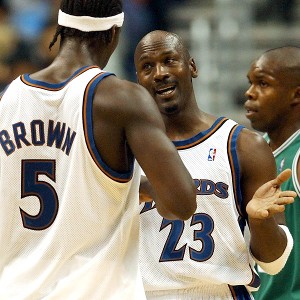We'll always have the video montages -- grainy as they are now in our high-def world -- to remind us of Michael Jordan's greatness. The acrobatics. The big shots (Craig Ehlo andBryon Russell still have sleepless nights). The moments (like too-sick-to-walk-but-healthy-enough-to-win and the wondrous shoulder shrug). The dunks. The tongue. The tears. Heck, we even have "Space Jam"!
And we'll always have Air.The numbers won't change, either. Fourteen All-Star Game appearances. Eleven scoring championships. Five MVP awards. Six rings.The best there ever was, at least from this seat.That was just inside the lines. MJ also changed the industry's bottom line like no one before or since: The videos. The endorsements. The ratings. The tickets. The brand. And of course, Money, the shoes! In 1998, in a cover story for Fortune magazine called "The Jordan Effect," I and a team of journalists and economists calculated that he alone had generated $8 billion in revenue. And that was 14 years ago.So Jordan's status as a player is secure. His claim to having the biggest financial impact on the basketball industry of anyone in the history of the game is etched in granite as well.And his value as a brand icon remains as robust as ever.His legacy?Not so fast.That's still being written. And frankly, the most recent chapters stink.
[+] Enlarge

Heather Hall/AFP/Getty ImagesAfter drafting Kwame Brown, Michael Jordan worked with him on the floor.
It's a tricky matter, this legacy thing, for any of us. As we make our journey through life, experiencing our highs and lows, for what will we be mostremembered?For athletes, it's usually easy. They generally cement their legacies with their skills, their performances. True greatness is rarely disputed, and, to borrow a phrase we hear a lot these days, numbers never lie.How they lead their lives once the cheering stops should not affect their legacies, but it can. And sometimes does. For better and worse.Do we think somewhat less now of, say, Lawrence Taylor, the NFL's most feared defensive player ever, after his ignominious 2010 arrest and subsequent plea to patronizing a prostitute and sexual misconduct, charges stemming from a sordid encounter involving a 16-year-old girl? Yeah.
Jordan, alas, doesn't make that team. Not even close. He's been a decision-maker in some capacity for well more than a decade now and still hasn't eradicated the embarrassment of his first major draft selection as Washington Wizards president of basketball operations: teenager Kwame Brown, the No. 1 overall pick. That 2001 draft also bore future All-Stars Pau Gasol, Gilbert Arenas, Joe Johnson and Tony Parker. In fact, Jordan all but confirmed his ineptness by drafting Adam Morrison No. 3 overall in 2006, overlooking future stars Brandon Roy, Rudy Gay and Rajon Rondo, as a Bobcats minority shareholder and head of basketball operations.As an owner, Jordan is still a relative neophyte. And that might be his only saving grace. He has time to figure it all out, and, well, he won't fire himself -- although he has actually done so, sort of. During the offseason, Jordan lured respected talent evaluator Richard Cho to Charlotte as the team's general manager. Cho had worked for Seattle and Portland, and was widely known for developing an effective model for assessing basketball talent.
In the meantime, I'll watch "Space Jam."














0 comments: